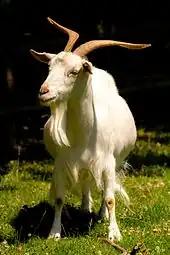dabeela
Afar

Dabeela.
Etymology
Borrowed from Amharic ዳቤላ (dabela).
Pronunciation
- IPA(key): /dʌˈbeːlʌ/
- Hyphenation: da‧bee‧la
Declension
| Declension of dabéela | ||||||||||||||||||
|---|---|---|---|---|---|---|---|---|---|---|---|---|---|---|---|---|---|---|
| absolutive | dabéela | |||||||||||||||||
| predicative | dabéela | |||||||||||||||||
| subjective | dabeelí | |||||||||||||||||
| genitive | dabeelí | |||||||||||||||||
| ||||||||||||||||||
See also
- wadár (“goats”)
References
- E. M. Parker; R. J. Hayward (1985), “dabeèla”, in An Afar-English-French dictionary (with Grammatical Notes in English), University of London, →ISBN
- Marie-Claude Simeone-Senelle; Mohamed Hassan Kamil (Aug 2013), “Gender, Number and Agreement in Afar (Cushitic language)”, in 43th Colloquium on African Languages and Linguistics, Leiden: Leiden University
- Mohamed Hassan Kamil (2015) L’afar: description grammaticale d’une langue couchitique (Djibouti, Erythrée et Ethiopie), Paris: Université Sorbonne Paris Cité (doctoral thesis)
This article is issued from Wiktionary. The text is licensed under Creative Commons - Attribution - Sharealike. Additional terms may apply for the media files.